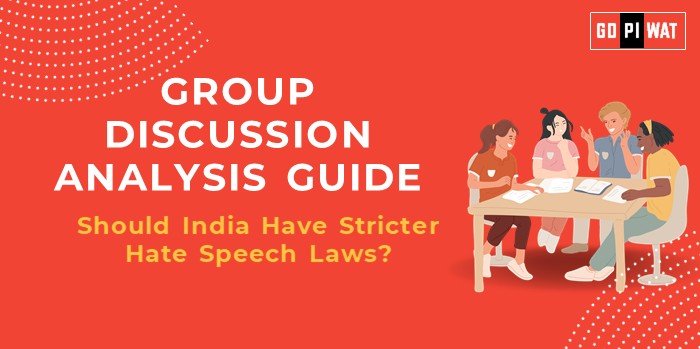📋 Group Discussion (GD) Analysis Guide: Should India Have Stricter Hate Speech Laws?
🌐 Introduction to the Topic
- 💬 Opening Context: Hate speech laws are integral in fostering societal harmony, especially in a diverse country like India. The debate revolves around whether existing laws suffice or if stricter regulations are needed to address modern challenges.
- 📜 Background: India’s current legal framework includes Section 295A and Section 153A of the IPC, which address religious and community-based hate speech. Recent social media amplification and communal incidents have highlighted gaps in enforcement and regulation.
📊 Quick Facts and Key Statistics
- 📈 Hate Speech Cases in 2023: Over 5,000 cases reported, marking a 30% increase since 2020 (NCRB, 2023).
- 🌐 Social Media Reach: 467 million active users in India, making online hate speech widespread.
- 📉 Global Rank in Internet Freedom: India ranked 52/100 (Freedom House, 2023), citing concerns over misuse of speech regulation.
- ⚖️ Conviction Rate: Hate speech convictions remain below 10%, reflecting enforcement challenges.
🔍 Stakeholders and Their Roles
- 🏛️ Government Agencies: Formulate and enforce laws.
- ⚖️ Judiciary: Interpret hate speech laws, balancing free speech and societal harmony.
- 👥 Citizens: Exercise responsible freedom of expression.
- 🌐 Social Media Platforms: Implement robust content moderation policies.
- 🤝 NGOs: Advocate for marginalized communities and monitor hate speech incidents.
🏆 Achievements and Challenges
Achievements:
- ⚖️ Judicial Oversight: Landmark cases like Shreya Singhal v. Union of India have balanced free speech and restrictions.
- 💻 Proactive State Actions: States like Kerala monitor communal rhetoric effectively through social media cells.
Challenges:
- 📜 Ambiguity in Definitions: Current laws lack clear parameters for identifying hate speech.
- 🚨 Selective Enforcement: Concerns over political misuse of laws.
- 🌐 Social Media Proliferation: Lack of regulation amplifies hate speech’s reach.
Global Comparisons:
- 🇩🇪 Germany: NetzDG law enforces social media accountability.
- 🇺🇸 USA: Strong free speech protections but growing concern over misinformation.
🎯 Structured Arguments for Discussion
- ✅ Supporting Stricter Laws: “With rising communal tensions, stricter laws are essential to deter hate speech and foster harmony.”
- ⚖️ Opposing Stricter Laws: “Stringent laws may stifle free speech and lead to misuse by authorities.”
- 🤝 Balanced Perspective: “India needs targeted reforms in hate speech laws to address digital age challenges without stifling free speech.”
🗣️ Effective Discussion Approaches
Opening Statements:
- 📊 “With a 30% rise in hate speech cases since 2020, stricter regulation becomes imperative.”
- 🌍 “Countries like Germany have successfully curbed online hate speech through targeted laws.”
Counter-Argument Handling:
- 🔄 Example: Emphasize the need for judicial safeguards, referencing landmark cases to address concerns about misuse.
🔍 Strategic Analysis of Strengths and Weaknesses
- 💪 Strengths:
- Growing legal precedence and proactive state actions.
- Increased citizen awareness about responsible speech.
- 🔧 Weaknesses:
- Enforcement gaps and lack of clarity in laws.
- 🌟 Opportunities:
- Technology-enabled monitoring systems.
- Public-private initiatives to enhance enforcement.
- ⚠️ Threats:
- Political misuse of laws.
- Erosion of free speech rights.
💼 Connecting with B-School Applications
Real-World Applications: This topic links to social media analytics, legal frameworks, and societal studies in ethics courses.
Sample Questions:
- 💡 “How would stricter hate speech laws impact freedom of expression?”
- 💡 “What role can technology play in curbing hate speech?”
Insights for Students: Understand the balance between free speech and regulation, and explore cross-sector collaboration for societal benefit.


